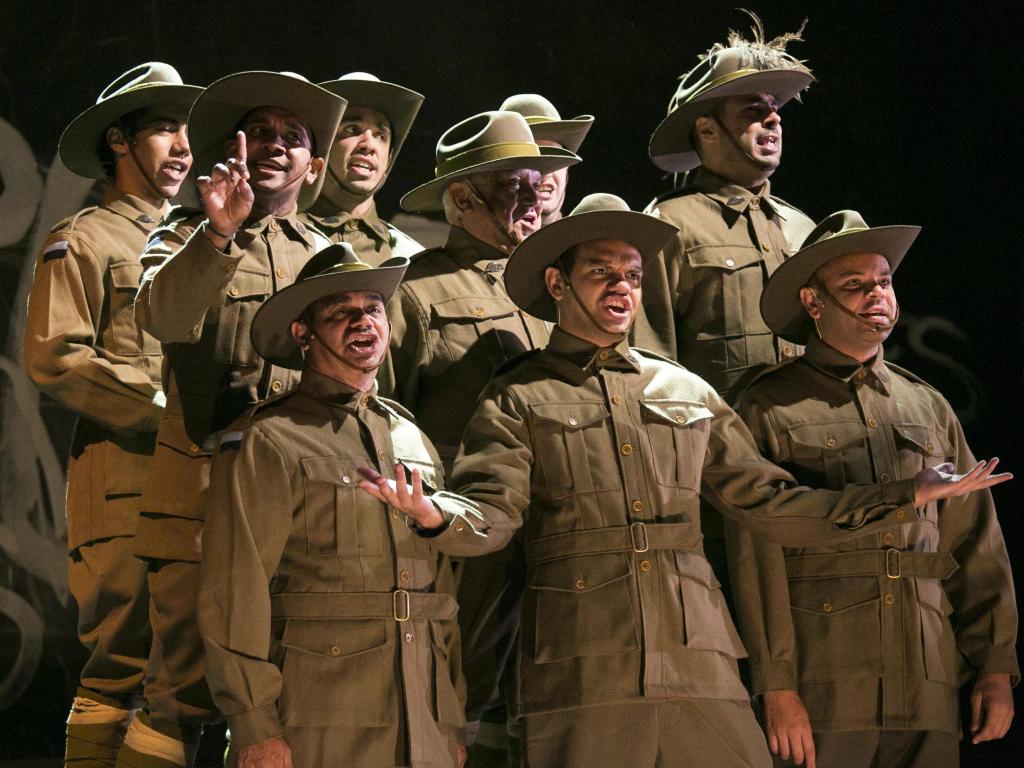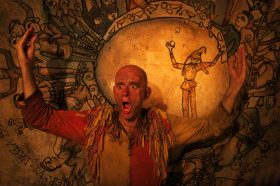The cast of Black Diggers. Photo by Jamie Williams.
In this centennial year of the Gallipoli landing, we see many events and commemorations – public, commercial, educational, artistic, inspiring and horrifying in varying measure – to mark the occasion. More than a tactical manoeuvre in a convoluted war of empires, the failed campaign has become a shorthand for the development of a certain aspect of Australian nationhood and patriotic rallying. Despite the long emphasis on ANZAC WWI exploits, the experience of Aboriginal soldiers has been absent from both schoolbooks and popular culture.
Black Diggers steps in to fill this vacancy. Staying away from the easy option of piggybacking off the hero mythos of mainstream Australian culture, Director Wesley Enoch tackles the multiplicity of backgrounds, motivations, experiences and outcomes for the Indigenous men who enlisted in the Australian army. Presented as a series of vignettes, portions of the stories of various individuals serve as a sampler across the range of tales that need telling.
Tom Wright’s script starts well before the calls for volunteers, the life experiences of the Aboriginal men in Australian society ranging from bemused detachment from white concerns to infant adoption as scientific curiosities in the wake of family loss by massacre. The war raises the opportunity for a change of scene, a change of social norms and a proving ground for a tradition of warrior pride. Race, fitness and age are some of the barriers encountered when enlisting, but ways are found around all obstacles. While Gallipoli is discussed, the actions along the Western Front are also marked as the names of places the soldiers were deployed written on the walls. Experience in the trenches is different from man to man, but there is a common sense of equal belonging and acceptance with white Australian soldiers. Much humour is found, celebrating the larrikin spirit and resilient reactions of the diggers to trying and horrifying circumstances, as well as traumatic events that leave physical and mental scars. These familiar tropes of the ANZAC mythos serve to emphasise the commonalities between all enlisted troops, black or white. The personal and social changes and lack of changes after demobbing have their own pathos, and offer contemporary audiences a chance to reflect on the personal effects of global events.
The all-male cast works incredibly well as an ensemble, ensuring smooth transition between the many scene breaks and jumps. Such a well-oiled machine makes it hard to identify any outstanding players, as the quality of acting remained consistently high. By virtue of age and gravitas, George Bostock brings a considered pride to the stage, a Vietnam veteran who personally represents a century’s experiences for Aboriginal veterans. The mix of ages and acting experiences bring a multitude of approaches to presenting the various characters from this script, but firm directorial guidance keeps the pace moving.
Stephen Curtis delivers a versatile set that uses its walls for words while the raised planks at centre stage serve as an Australian backyard, no-man’s land and the bar of a country pub, all without skipping a beat. Ben Hughes designs sympathetic and useful lighting which is key in distinguishing separate scenes, assisting in smooth transition between sharply different storylines. Songs are sung at various points, and we even have a visit from a bugler on ANZAC Day, with musical contributions more heartfelt than technically accomplished, and so bearing a relatable ring of authenticity.
An entirely Indigenous cast is a remarkable sight in contemporary mainstream Australian theatre. The stories of the men who overcame all manner of prejudice and social injustice to make a contribution to Australia’s military efforts are extraordinary. The focus of this presentation, of human trials and triumphs in difficult times, is best captured by the ANZAC Day exhortation, writ large on the walls of the theatre: LEST WE FORGET.
Rating: 4.5 stars out of 5
Black Diggers
A Queensland Theatre Company and Sydney Festival co-production
Presented in association with Perth Theatre Trust
Written by Tom Wright
Directed by Wesley Enoch
Set Designer: Stephen Curtis
Costume Designer: Ruby Langton-Batty
Lighting Designer: Ben Hughes
Composer/Sound Designer: Tony Brumpton
Dramaturg: Louise Gough
Cultural Consultant: George Bostock
Researcher: David Williams
Performed by George Bostock, Luke Carroll, Shaka Cook, Trevor Jamieson, Kirk Page, Guy Simon, Colin Smith, Eliah Watego and Tibian Wyles
Heath Ledger Theatre, State Theatre Centre of WA, Perth Cultural Centre
3-7 March 2015
Part of Perth International Arts Festival 2015
Additional dates:
10 – 14 March: Her Majesty’s Theatre, Adelaide
20 – 21 March: Newcastle Civic Theatre, Newcastle
25 – 28 March: Canberra Theatre Centre, Canberra
22 – 26 April: Melbourne Arts Centre, Melbourne
1 – 2 May: Ulumbarra Theatre, Bendigo





